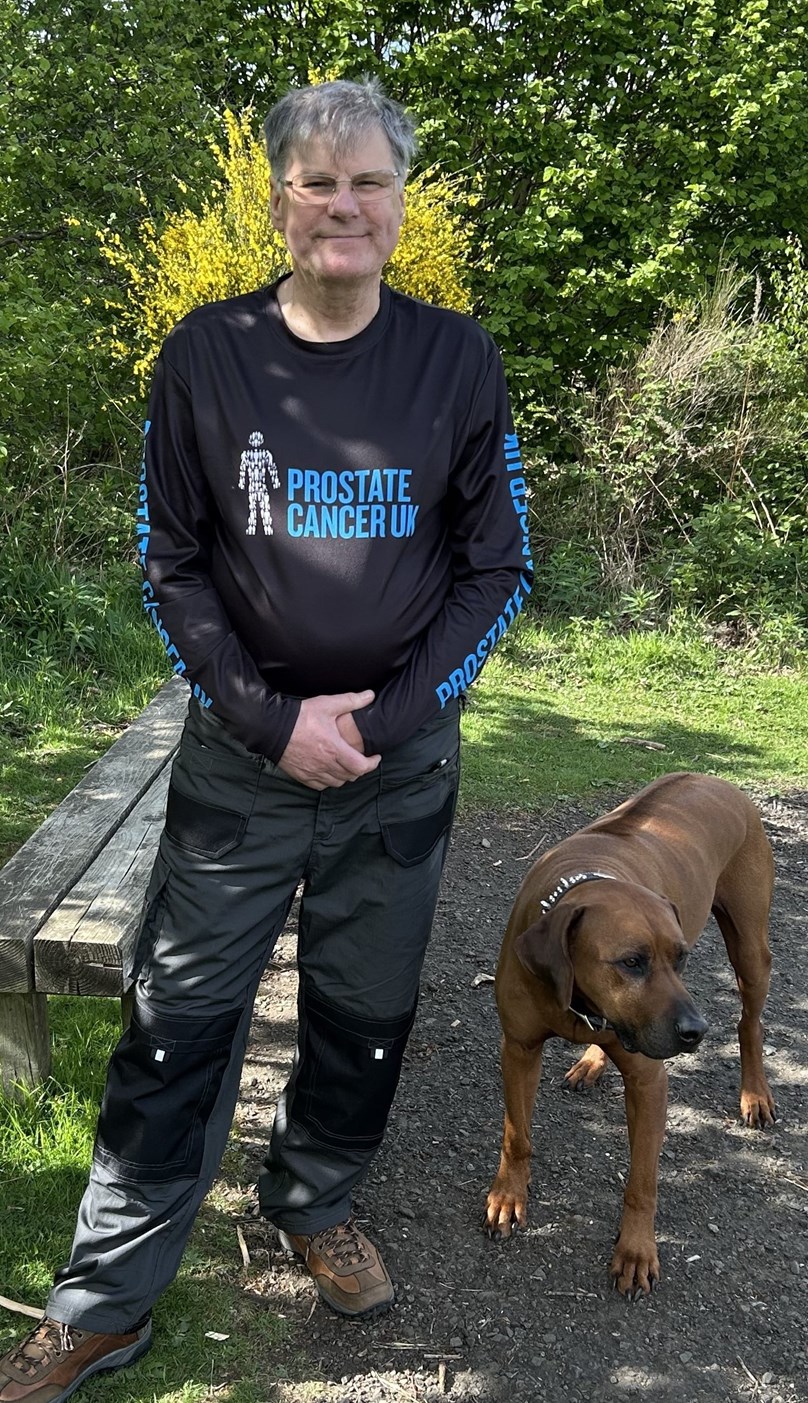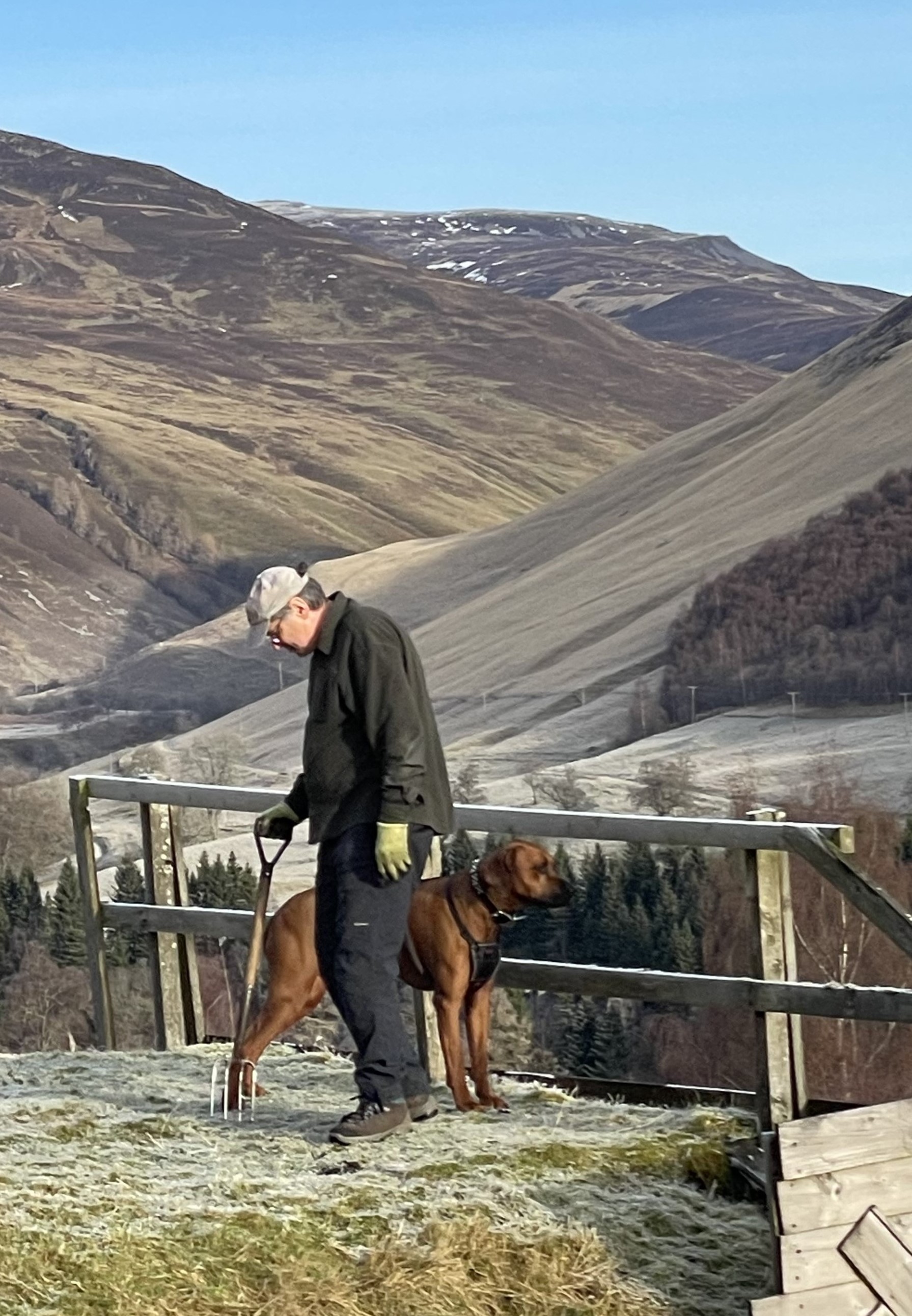John's radiotherapy story
John was diagnosed with locally advanced prostate cancer in March 2024, when he was 70. He was given hormone therapy and a course of radiotherapy. Here, he kindly shares his story.
My diagnosis
My diagnosis came by accident. The GP thought I had a urinary infection, but the results for that were negative. I then had more tests, which included a PSA blood test.
My PSA level was 67 – well above normal. I went on to have a prostate biopsy which, for me, was painless with no complications. It felt like they were using a small staple gun.
The specialist nurse broke the news. They told me that all 24 samples were positive for cancer and I needed treatment. It felt as if the floor gave way from under me. I didn’t know what to say.
The good news was the lymph nodes were clear and there was no evidence the cancer had spread.

My treatment
I started hormone therapy injections within a week, and two months later had an appointment with the oncologist to assess my fitness for radiotherapy.
There wasn’t any talk about other treatment options, and I didn’t ask. I was assured the cancer had been caught just in time and I felt confident in the doctor’s expertise.
I did ask what my future would look like if I had radiotherapy. He said the aim is to cure. Who could argue with that?
Radiotherapy
I had 20 sessions of radiotherapy at The Lanarkshire Beatson cancer centre – five days a week over the course of a month. I drove to the hospital. Usually my wife, Patricia, came with me and sometimes our dog, Jak. They’d go for a walk and be waiting for me outside when I was finished. This helped me feel supported and like I wasn’t going through it alone.
The centre was bright and relaxing, and the staff were welcoming and friendly. I was quickly put at ease and made to feel like part of a team, which made the emotional side so much easier to bear.
The sessions were in the afternoon, which was perfect for me. I worked in the morning and relaxed at home afterwards. So the treatment fitted in with my work, while giving me some extra badly needed home-time.
I felt nervous before the first session but had every confidence in the process. I would arrive at the cancer centre 30 minutes before a session and drink three cups of water. The bladder needs to be full for treatment so I was always relieved when the radiotherapy started! It took about 10 minutes, after which an urgent visit to the loo was needed!
I was physically comfortable during the sessions and had no problem keeping still, but I was afraid to breathe during the actual radiotherapy! I was mostly concerned about holding my bladder until the session was complete.
Radiotherapy is painless, like having an X-ray. And I enjoyed learning about the LINAC (a type of radiotherapy machine). The nurses were happy to explain everything. At my last session I had a lump in my throat saying goodbye to everyone – they had made it so easy to take it all in my stride.
Hormone therapy
I’ve had injections every three months since my diagnosis. However, I had my last injection in March 2025. The side effects have been really hard to live with, so I made the decision, with my doctor, to stop hormone therapy. My PSA has remained undetectable since last year, and I am in no doubt that this is due to the radiotherapy.
My side effects
The effects on my bowel and bladder were distressing and inconvenient. I would have an urgent need to get to a loo within 10 seconds. I quickly learned that to ignore a 10-second warning risked an accident. These side effects have been challenging, but a small price to pay for learning that the cancer has gone.
I had to excuse myself from some social activities when I started the radiotherapy, but towards the end of the year I attended a couple of events as I’d found ways to manage the side effects.
Regarding the hormone therapy, during the day I can cope – it’s the insomnia, hot flushing, chills and night sweats I find hard. I often can’t get to sleep or I keep waking up.
Managing my side effects
Living with the side effects can be challenging, but I’ve found ways of coping that work for me. If I’m going somewhere, to stop the bowel urgency I take one loperamide (anti-diarrhoea medicine) the night before and I’m fine the next day. I’ve also stopped eating overly spicy or fatty food. It has affected the way I live my life in some ways, but not so much that it’s stopped me from going about my daily life.
I take tamsulosin (medicine to help with urine flow) to help manage the urinary urgency. It used to make me feel dizzy and nauseous, but I have changed how I take it, which has helped. Speak to your doctor about what you can do if you’re not tolerating it well.
I had some rectal bleeding (bleeding from the back passage) recently which worried me, but the nurse told me it was normal and directed me to the booklet I had been given when I finished the radiotherapy. My advice is to get all the information you can about radiotherapy, so you don’t panic like I did!
Sadly, the effects of radiotherapy on my bladder and bowel are likely to be lifelong, but things are improving with time. My main advice to any man considering radiotherapy is that curing cancer is worth the risk. It would take a brave man to refuse radiotherapy because of fear of side effects.

Where I am now and what’s next
I try to be positive. All treatments have their downsides. It’s just a matter of getting on with it. I’ll be having a PSA test every six months to keep an eye on everything. There’s always some doubt in my mind that it will come back, but I’m feeling positive.
Besides that, life continues as normal. I’m still running my busy legal practice alongside my wife. When I do have time off, I like to spend it in the garden or taking long walks in Stirling with our dog.
Sometimes I think, “Why did I have to come down with this dreadful disease?” When I feel like this, or when I want to talk to others in a similar situation or get more information, the Prostate Cancer UK online community has been so supportive, the people on there are so knowledgeable.
I never used to speak openly about my health. Now, I am only too happy to talk about my experience, the treatments and the result. Maybe being more open has allowed me to be more accepting of my disease.
Story added: June 2025

